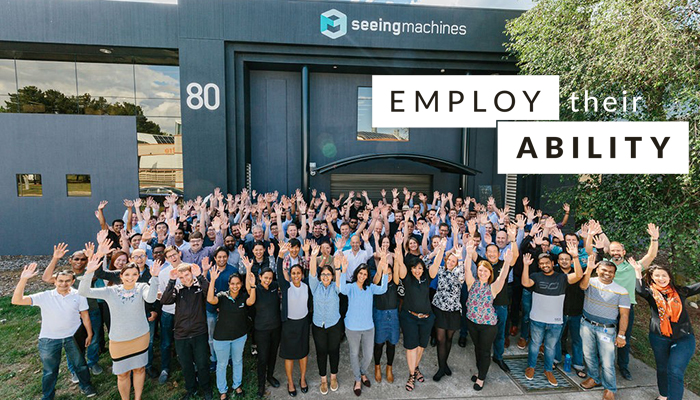Re-thinking the workforce: Seeing Machines embrace an innovative pathway to disability employment

Image: Seeing Machines staff at their office in Fyshwick, Canberra (Source: Seeing Machines)
Road accidents involving commercial vehicles are a common cause of casualties worldwide.
In Australia alone, there were nearly 150 fatal crashes involving heavy trucks during the 12 months to March 20191. Canberra-based technology company Seeing Machines aims to change this.
Seeing Machines is at the forefront of artificial intelligence (AI) technology that equips machines to decipher facial expressions.
It uses its proprietary Guardian technology to help prevent accidents and improve safety through real-time driver monitoring and reporting of high-risk behaviours such as fatigue and distraction. So far, the technology has helped detect over 4 million distraction events and, over the past year, intervened in more than 109,000 instances of fatigue.
Until recently Seeing Machines offered 24-hour support to global logistical and transport enterprises from its Guardian Centre in Tucson, Arizona in the United States. An operational review to adopt a ‘follow the sun’ approach saw Seeing Machines launch a new monitoring centre in Canberra to share services with Tucson.
With a view to encourage disability employment, Seeing Machines introduced Project Embrace – an initiative to create targeted opportunities in Canberra for the local community of neuro-diverse candidates, including people on the autism spectrum.
Learning and Development Manager at Seeing Machines, Gillian Smith said it would likely have a positive impact.
“Our goal was to provide people with disability a pathway into meaningful employment and identify skills to fit with the role of an analyst,’’ she said.
Analysts at the monitoring centre undertake repetitive tasks like observing drivers’ facial expressions using videos or images and classifying their behaviours, such as being distracted, tired or sleepy. Seeing Machines proposed to engage high-functioning neuro-diverse people who are comfortable performing repetitive tasks.
To facilitate training and employment, the company secured funding support through the ACT Government’s inaugural Future Skills for Future Job Grants Program. Seeing Machines also tapped into Australian Apprenticeships to attract skilled candidates for the role.
“Before advertising the position, we invited a focus group involving people on the spectrum to help them understand the requirements of the role and conduct an on-site job trial,” Ms Smith said. The feedback was overwhelming. “They all took to it and loved working on it!”
The grants co-development approach helped Seeing Machines foster partnerships with the Australian Government and other public and private stakeholders. Skills Canberra connected Ms Smith with the JobAccess Employer Engagement team (also known as the National Disability Recruitment Coordinator – NDRC).
“Given the complexities involved in getting this project up and running, Skills Canberra helped us establish a collaborative network of specialist organisations. The NDRC became a vital partner in the disability employment space.”
The NDRC works with larger employers during 12-month partnerships with the intent to instil inclusive workplace practices and build employers’ disability confidence through advice, education and awareness.
NDRC Professional Adviser Mina Aziz supported Seeing Machines on a wide range of employment matters, starting from a tailored recruitment review. “The NDRC’s inputs helped us modify job advertisements to demonstrate our openness to employing people with disability,’’ Ms Smith said.
“We also adapted the interview process to ensure accessibility and improve the overall candidate experience.” The NDRC guided Seeing Machines on accessing support through JobAccess to organise workplace adjustments and modifications that could be reimbursed through the Australian Government’s Employment Assistance Fund.
As part of the NDRC partnership, Mr Aziz delivered disability awareness training to more than 50 employees across all departments and management levels in Canberra and two Tucson-based team members via video link. Ms Smith said the training had a significant impact in the workplace.
“It stimulated conversations among different teams and open discussions on topics such as 'how can we be more inclusive in our environment?' and 'how can we improve diversity?”
Just under a year since concept inception, Project Embrace is already delivering benefits. The initiative has seen Seeing Machines diversify its workforce and broaden its talent pool.
Director - Projects at Skills Canberra Melissa Pinney shares, “The innovation grant enabled Seeing Machines to explore a traineeship model that could be embedded into its workforce development strategy. As a result of this project, Seeing Machines can better understand the Australian Apprenticeships system and see how traineeships can support its workforce requirements.”
Ms Smith said the results were clear.
“So far we have employed 18 apprentices with neuro-diverse conditions as well as six managers to support the team,’’ she said.
“Operating out of Tucson and Canberra allows the staff to have reasonable working hours. Also, our engineering teams are now able to access data directly from analysts based here.
“The overall benefit is to the individual. The experience adds to their qualifications and they gain nationally-accredited certifications that improve their employment prospects. Moreover, they feel valued in being part of a role that helps save people’s lives. For us, as an employer, it means working with dedicated employees who are committed, go above and beyond, and love doing their job,” Ms Smith concludes. Going forward, Seeing Machines aims to identify other opportunities to employ more people with disability as the business grows.
The JobAccess Employer Engagement team (NDRC) provides tailored, one-to-one personalised support to help employers become disability fit. Contact a JobAccess Adviser on 1800 464 800, and they can connect you to the NDRC.
About JobAccess
Funded by the Australian Government, JobAccess is the multi award-winning national hub for workplace and employment information for people with disability, employers and service providers.
Recognised internationally for its innovative approach to disability employment, JobAccess brings together a wide range of resources including a website, dedicated advice service, the Employment Assistance Fund for workplace modifications and training, and the Employer Engagement team (NDRC) providing free and practical support to employers to become disability confident.
For more information, visit www.jobaccess.gov.au or call 1800 464 800 to speak with a JobAccess Adviser.
Source:
1Fatal Heavy Vehicle Crashes Australia—Quarterly Bulletins.
https://www.bitre.gov.au/publications/ongoing/fatal_heavy_vehicle_crashes_quarterly.aspx
Last updated:
